
Muhammad Zia-ul-Haq was a Pakistani military officer who served as the sixth president of Pakistan from 1978 until his death in 1988. He also served as the second Chief of Army Staff of the Pakistan Army from 1 March 1976 until his death.
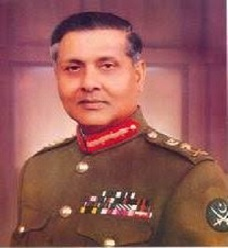
General Mirza Aslam BegNI(M) HI(M) SBt LoM, also known as M. A. Beg, is a retired Pakistani four-star general who served as the third Chief of Army Staff of the Pakistan Army from 1988 until his retirement in 1991. His appointment as chief of army staff came when his predecessor, President General Muhammad Zia-ul-Haq, died in an air crash on 17 August 1988.
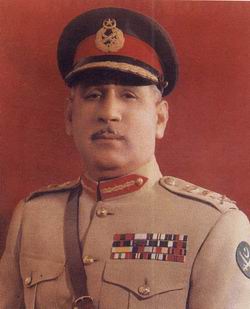
Tikka Khan was a Pakistani military officer who served as the first chief of the army staff from 1972 to 1976. Along with Yahya Khan, he is considered a chief architect of the 1971 Bangladesh genocide which according to independent researchers led to the deaths of 300,000 to 500,000 people.

General Asif Nawaz Janjua NI(M), HI(M), SBt, psc, was a senior officer of the Pakistan Army who served as the fourth chief of army staff from 16 August 1991 until his death from arsenic poisoning. His family commissioned a private test on hair from his brush, which was conducted in the United States. The test registered high levels of arsenic. As a result, his body was exhumed, and an autopsy was conducted by French, British, and American doctors. The cause of death was determined to be a heart attack, which can also be caused by exposure to low or mild levels of arsenic. Benazir Bhutto also believed he was murdered by political opponents, namely Nawaz Sharif.

The Pakistan Army, commonly known as the Pak Army, is the land service branch and the largest component of the Pakistan Armed Forces. The president of Pakistan is the supreme commander of the army. The Chief of Army Staff (COAS), a four-star general, commands the army. The Army was established in August 1947 after Pakistan gained independence from the United Kingdom. According to statistics provided by the International Institute for Strategic Studies (IISS) in 2024, the Pakistan Army has approximately 560,000 active duty personnel, supported by the Pakistan Army Reserve, the National Guard and the Civil Armed Forces. Pakistan Army is the sixth-largest army in the world and the largest in the Muslim world.

Major-General Naseerullah Khan Babar was a Pakistani army officer, diplomat, and politician who served as the 28th Interior Minister of Pakistan from 1993 to 1996. A member of the Pakistan Peoples Party, he also served as the 12th Governor of Khyber Pakhtunkhwa Province between 1975 and 1977. He was a retired 2-star general officer in the Pakistan Army, and later career military officer-turned-statesman.
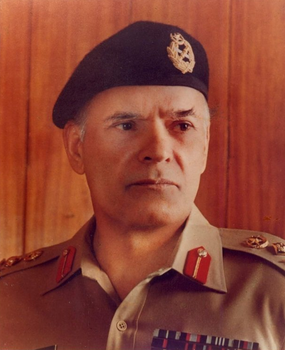
Akhtar Abdur Rahman, was a Pakistan Army general who served as the 5th Chairman Joint Chiefs of Staff Committee from 1987 until his death in 1988. He previously served as the 7th Director-General of Inter-Services Intelligence from 1979 to 1987. During both Indo Pak wars of 1965 and 1971, he oversaw action with his own unit 45 Field Regiment Artillery in Sundra and Hussainiwala sectors respectively.
The Pakistan coup attempt of 1995 or Operation Khalifa was a secretive plot hatched by renegade military officers and against the government of Benazir Bhutto, the prime minister of Pakistan. The plotters aimed to overthrow the constitutional government and establish military rule in Pakistan. The plot was foiled after intelligence agencies tipped off the Pakistan Army. Despite the failure, the coup attempt would weaken Bhutto's government considerably in the aftermath.
Lieutenant General Ali Kuli Khan KhattakHI(M) is a retired Pakistani three-star rank general officer and former field commander of X Corps.

The Sitara-e-Imtiaz also spelled as Sitara-i-Imtiaz, is the third-highest honour and civilian award in the State of Pakistan. It recognizes individuals who have made an "especially meritorious contribution to the security or national interests of Pakistan, world peace, cultural or other significant public endeavours".
General Sawar KhanNI(M) HI(M) SBt was a four-star general of the Pakistan Army who was the Governor of the largest province, Punjab and the Vice Chief of Army Staff during the era of General Muhammad Zia-ul-Haq, when Zia was simultaneously the Chief of Army Staff (Pakistan) and the President of Pakistan.
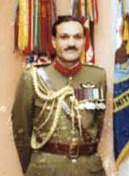
General Khalid Mahmud ArifNI(M) HI(M) SI(M) SBt LoM popularly known as K.M. Arif, was a senior officer of the Pakistan Army, serving as the vice-chief of army staff under President Zia-ul-Haq, who retained the command of the army since 1976.
The political history of Pakistan is the narrative and analysis of political events, ideas, movements, and leaders of Pakistan. Pakistan gained independence from the United Kingdom on 14 August 1947, when the Presidencies and provinces of British India were divided by the United Kingdom, in a region which is commonly referred to as the Indian subcontinent. Since its independence, Pakistan has had a colorful yet turbulent political history at times, often characterized by martial law and inefficient leadership.
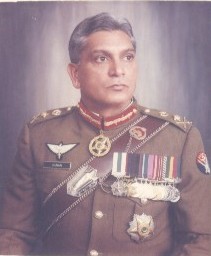
General Shamim Alam Khan, NI(M) HI(M) SJ SBt LoH, was a four-rank general in the Pakistan Army who served as the 7th Chairman Joint Chiefs of Staff Committee from 1991 until retiring in 1994.
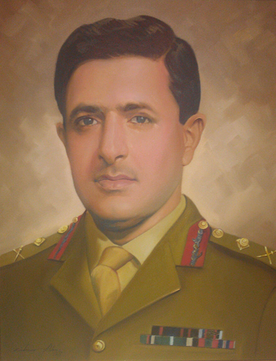
Major General Tajammul Hussain Malik was a senior officer in the Pakistan Army and the former General Officer Commanding of the 23rd Division of Pakistan Army, retiring with the rank of major general. He was the commanding officer of Pakistani forces at the Battle of Hilli during the Indo-Pakistani war of 1971, and headed a failed coup attempt against the regime of Zia-ul-Haq in 1980 which resulted in a court-martial held by Judge Advocate General Branch of Pakistan Armed Forces headed by General Zia-ul-Haq.
The 1977 Pakistani military coup was the second military coup in the history of Pakistan. Taking place on 5 July 1977, it was carried out by Muhammad Zia-ul-Haq, the chief of army staff, overthrowing the government of Prime Minister Zulfikar Ali Bhutto.
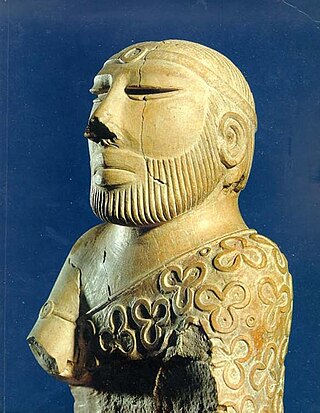
Military coups in Pakistan began in 1958 when military officer Muhammad Ayub Khan overthrew and exiled president Iskandar Ali Mirza. Since its creation in 1947, Pakistan has spent several decades under military rule. After their respective terms in office, each of the past five prime ministers of Pakistan has faced convictions or imprisonment. This trend highlights a significant aspect of Pakistan's political landscape: the prevailing rule that the Pakistani military exercises influence wherever it deems necessary, often persisting despite potential repercussions. Throughout Pakistani history, the military has played a prominent role in governance, with periods where it has directly ruled the country.
The 111th Independent Infantry Brigade Group, commonly known as the 111th Brigade or Triple-1 Brigade, is an infantry brigade of the Pakistan Army notable for its frequent involvement and fast response in military coup d'etats since Pakistani independence. From 11 January 2012 Brigadier Sarfraz Ali commanded the Brigade. He succeeded Brigadier Faheem Rao who had earlier replaced Brigadier Asim Salim Bajwa.
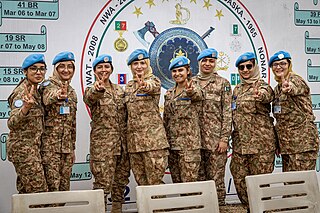
Women in the Pakistan Armed Forces are the female officers who serve in the Pakistan Armed Forces. In 2006, the first women fighter pilot batch joined the combat aerial mission command of PAF. The Pakistan Navy prohibits women from serving in the combat branch. Rather, they are appointed and serve in operations involving military logistics, staff and senior administrative offices, particularly in the regional and central headquarters. There was a rise in the number of women applying for the combat branch of PAF in 2013.
Lieutenant General Sahibzada Muhammad Sadiq ur-Rashid Ibrahim Abbasi, also known as S.M. Abbasi, was a three star general in the Pakistani Army, Governor of Sindh and member of the Bahawalpur royal family.












